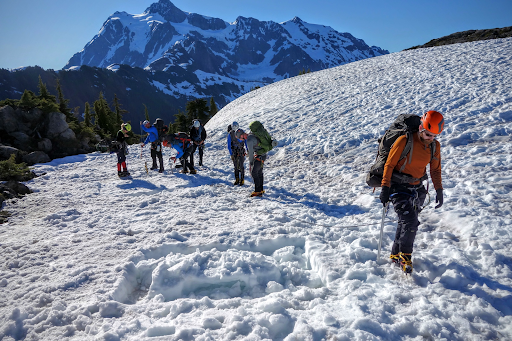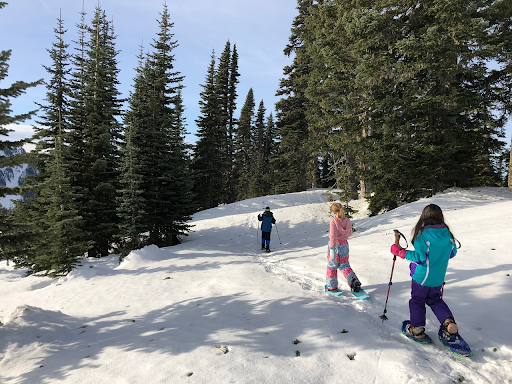
Picture this: you’re a small instructional group (SIG) leader for the Basic Alpine Climbing course with The Mountaineers. You've planned out all of your weeknight rope-tying and anchor-building clinics, and now you're excited to challenge your students with their first field trip on real rock. But all of your favorite teaching crags are already booked, The Mountaineers is out of permit days, and you can't find a location to run a trip. You may be the latest Mountaineer impacted by Washington’s cumbersome and inflexible public lands permitting systems.
Permits and Land Access: The Challenges We Face
In order to operate our courses on public lands, The Mountaineers needs to obtain special use permits from federal, state, and local land management agencies. These permits are intended to maintain our public lands for generations to come by making sure that recreation use is safe and sustainable. But here’s the catch: we often can’t get enough user days under these special use permits to satisfy demand for our courses. More and more aspiring mountaineers, alpine climbers, and backpackers want to take our courses, but permitting challenges are limiting our ability to get these adventurers outside.
In Washington, we’re lucky to have public land managers who are committed to building strong relationships with The Mountaineers. These partnerships are key to helping our community navigate the permitting process, but many of these land managers don’t have the resources to keep up with the demand for new permits. Nearly all of our federal, state, and local land management partners have been impacted by budget cuts, especially the U.S. Forest Service (USFS).
Since the 1990s, the USFS’s staff has been cut nearly in half. To make matters worse, about 70% of the remaining Forest Service staff responsible for administering permits now do so as a secondary duty to their regular job responsibilities. Our National Forest land managers do their best to manage increasing workloads, but they need more full time staff to keep up.
Unfortunately, permits are only one challenge when it comes to land access for our programs. Chronic underfunding of our public lands is a consistent threat to our ability to teach the next generation of outdoor recreationists, stewards, and advocates. A lack of funding to clear blowdowns and fix road washouts, inadequate parking at trailheads, and limited camping facilities have all contributed to more challenging conditions on the landscape. In recent years, roads leading to our program’s most popular teaching spaces, including the Paradise area of Mt. Rainier National Park and Cascade Pass in the North Cascades, have experienced long-term closures.
The Mountaineers has adapted to these challenges by using artificial teaching spaces like our indoor and outdoor climbing walls to teach our courses. These spaces are a great way to learn new outdoor skills, but at some point students need to put skill into practice in relevant outdoor terrain. Backpackers need to go on a backpacking trip, climbers need to climb on real rock, and alpinists need to experience the alpine.
Tackling these Challenges in our New Strategic Plan
Our community believes that everyone should have the opportunity to recreate safely and responsibly outside, but we’ve had to limit our scope due to permitting and land access challenges. We want that to change, which is why we are prioritizing finding solutions to these issues in our new strategic plan, Adventure with Purpose. One key step is the addition of an Associate Manager of Policy and Planning, Nathaniel Rees, to the Conservation and Advocacy team. With the added staff capacity made possible by the support of our donors, The Mountaineers plans to:
- Apply for special use permits in new areas. If we can expand our area of operation to new locations, we can move closer to meeting demand for outdoor education and recreation.
- Devote additional staff time to building relationships with land managers. These relationships are vital in helping us navigate a complicated permitting system.
- Partner with local outdoor organizations to work with local Forest Service staff to change district permit processes. We have a better chance of changing these systems if we work together.
- Participate in collaborative efforts to develop land management strategies in key locations for our courses, including the Alpine Lakes Wilderness and Mount Rainier National Park. These strategies will help us get our members outside while also preserving these landscapes for future generations.
- Advocate for change on a national level to address a lack of public lands funding and our dysfunctional federal permitting system.
 Seattle Pathfinders snowshoe near Paradise, Mount Rainier National Park. Public lands funding is critical to keeping the road to Paradise open daily during the winter and spring so that students can continue to explore. Photo by Katy Snyder.
Seattle Pathfinders snowshoe near Paradise, Mount Rainier National Park. Public lands funding is critical to keeping the road to Paradise open daily during the winter and spring so that students can continue to explore. Photo by Katy Snyder.
The Simplifying Outdoor Access to Recreation Act: A National Solution?
Through conversations with other outdoor recreation organizations, we realized we aren’t the only ones impacted by land access and permitting challenges. That’s why, in 2014, we decided to come together with key leaders in the outdoor recreation space to form the Coalition for Outdoor Access (COA). COA’s goal is to solve our dysfunctional permitting system on a national level by working with members of Congress to introduce key legislation.
Enter the Simplifying Outdoor Access to Recreation (SOAR) Act. If passed, the SOAR Act - which currently has bipartisan support in both the House and Senate - would simplify and streamline the recreational permitting process for federal agencies, making it easier for The Mountaineers to obtain permits for our courses on federal land. About 60% of our courses take place on federal public lands, so the passage of the SOAR Act would be a huge win for our community. We’ll keep you updated on the bill’s progress in Congress and how you can help get this important legislation across the finish line.
Throughout our history, The Mountaineers has seen the power of taking incremental steps toward a long-term vision. Our role in fighting to designate the North Cascades as a National Park or in protecting the Methow Valley from mining were not overnight successes, but rather years of hard work and commitment from our community. The permitting and land access challenges we face may be formidable, but we know that change is possible if our volunteers, partners, and staff work together.
Share Your Feedback
We want to hear your thoughts on what feels most important to you in approaching these issues. Email us at conservation@mountaineers.org with comments, questions, or concerns.
 The Mountaineers
The Mountaineers